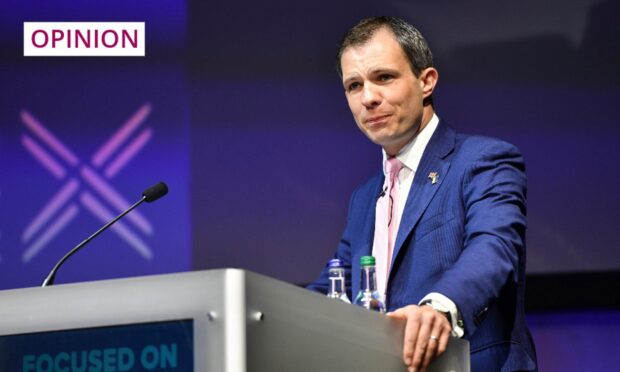It’s a story as old as time: a fresh-faced idealist enters the world of politics full of energy and absolutely committed to making a positive change in the world, and ends up a husk of their former self.
The need to compromise slows their drive and – in the worst instances – the tantalising prospect of power strips them of their principles. They become cynical, forgetting what motivated them to first stand for election, and start to put their personal ambition before all else.
In a bleak metamorphosis, they become the sort of person who gives politics a bad name.
Anyway, enough of my anxiety about the state of our body politic.
Let us, instead, consider the career of Andrew Bowie, the Conservative MP for West Aberdeenshire and Kincardine. Bowie, still a youthful 37, took that seat from the SNP in 2017 when he was – so far as anyone who knew him was concerned – a most moderate politician in the one nation tradition.
While his party at Westminster lurched further right under the control of Brexiteer wingnuts, Bowie seemed to understand that the resurrection of the Scottish Tories under former leader Ruth Davidson was – in part, at least – down to the perception that Conservatives did things differently north of the border. And then he got promoted.
Politicians should be ashamed of the tawdry game they’re playing
On Monday, the minister for nuclear and networks – for that is now the MP’s role – appeared on BBC Radio 4’s PM, where he was questioned about a speech delivered to Tory conference by Transport Secretary Mark Harper, in which he suggested local councils planned to dictate where and when people should shop. This is one of a number of fictions – see also the lies that we are soon to be forced to use seven different garden bins and meat is to be heavily taxed – created by the Conservatives to give the idea that, should Labour win the next election, our freedoms will be dramatically curtailed.
At least Bowie had the grace to sound awkward as he tried to defend Harper’s nonsense. People were worried, he said, that proposals for “15-minute cities” (a planning principle that says the services people require should be located near to where they live) represented “an infringement on their liberties, on their freedoms, on their ability to choose where they go to access services, to access what they need”. The Tories, he added, did not want “local authorities dictating” which services people should use and how often they should use them.
But Bowie must (and if he doesn’t, that’s a problem) know that no party has suggested new laws directing where and when people should go shopping or use any service. Reminded of this by presenter Evan Davis, Bowie insisted people were “concerned” about the matter.
Why did a government minister suggest local councils will be able to decide how often you can go to the shops at the Conservative conference today? @AndrewBowie_MP, Minister for Nuclear and Networks at the Department for Energy Security and Net Zero, explained on #BBCPM pic.twitter.com/NIWCQakFBo
— BBCPM (@BBCPM) October 2, 2023
If this is the case, it is only because Tory MPs, desperate to shore up their party’s dwindling support, are currently engaged in spreading scare stories to their core backers.
I hope Bowie is ashamed about his willingness to play this tawdry game.
The good people of West Aberdeenshire and Kincardine would – I daresay – like to be able to access services and shops that are located conveniently. I’d venture this is a view shared by those who live in every one of the United Kingdom’s 650 parliamentary constituencies.
How pathetic, then, that Bowie and other senior Tories are trying to characterise a perfectly sensible suggestion which would improve lives as a disturbing sign that councils are desperate to exert intolerable levels of control over us.
Each successive lie will be bigger and more dangerous
This stuff matters. In what seems to be a golden age for cynicism, politicians should be doing what they can to show democracy works and that it’s something worth defending. Rather, government ministers prefer to mislead the public, creating what the political writer HL Mencken described more than a century ago as “hobgoblins” against whom they must be defended.
Oh, you may say, this is just a lot of hot air about town planning. Where’s the real harm?
The harm is that once politicians get used to the idea that misleading voters is a vote-winning strategy, they will continue to do it
The harm is that once politicians get used to the idea that misleading voters is a vote-winning strategy, they will continue to do it. Each successive lie will be bigger. Each successive lie will be more dangerous.
Andrew Bowie entered the House of Commons as a politician of the moderate centre ground, a man regarded even by opponents as an honest broker. I wonder if he ever imagined he’d one day be reduced to peddling conspiracy theories in order to win the support of reactionary right-wingers.
Euan McColm is a regular columnist for various Scottish newspapers
